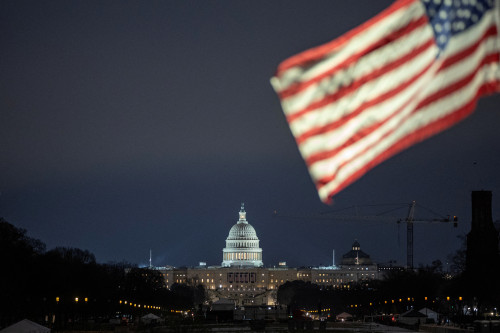By Tom Hals
WILMINGTON, Delaware (Reuters) – President Donald Trump launched his sweeping immigration crackdown on Monday which included an order reinterpreting birthright citizenship, a principle that has been recognized in the United States for more than 150 years.
Below is a look at U.S. birthright citizenship and Trump’s legal authority to restrict it.
WHAT IS BIRTHRIGHT CITIZENSHIP?
Anyone born in the U.S. is considered a citizen at birth, which derives from the Citizenship Clause of the 14th Amendment that was added to the Constitution in 1868. The amendment states: “All persons born or naturalized in the United States and subject to the jurisdiction thereof, are citizens of the United States and of the State wherein they reside.” The Immigration and Nationality Act of 1952 also defines citizens and includes similar language.
There were an estimated 11 million immigrants in the U.S. illegally in January 2022, according to a U.S. Department of Homeland Security estimate, a figure that some analysts now place at 13 million to 14 million. Their U.S.-born children are considered by the government to have U.S. citizenship. Trump has complained about foreign women visiting the United States for the purpose of giving birth and conferring U.S. citizenship on their offspring.
ARE THERE EXCEPTIONS?
Yes. People born in the United States to a foreign diplomatic officer with diplomatic immunity are not U.S. citizens because they are not subject to the jurisdiction of the United States.
WHAT DOES TRUMP’S EXECUTIVE ORDER SAY?
Trump’s order declared that individuals born in the United States are not entitled to automatic citizenship if the mother who was in the country unlawfully and the father was not a citizen or lawful permanent resident. It also declared citizenship would be denied to those whose mother was in the United States lawfully but temporarily, such as those on student or tourist visas, and whose father was not a citizen or lawful permanent resident.
WHAT HAS THE SUPREME COURT SAID?
The Supreme Court has not addressed whether the Citizenship Clause applies to U.S.-born children of people who are in the United States illegally.
The main birthright citizenship case is from 1898, when the Supreme Court ruled that the son of lawful immigrants from China was a U.S. citizen by virtue of his birth in 1873 in San Francisco. The man, Wong Kim Ark, had been denied re-entry to the United States after a visit to China at a time when immigration from China was severely restricted.
The Supreme Court also ruled in 1884 in a dispute over voter registration that U.S.-born John Elk was not a citizen because he was born as a member of a Native American tribe and therefore not subject to U.S. jurisdiction. Congress extended U.S. citizenship to Native Americans in 1924.
WHAT IS THE VIEW OF OPPONENTS OF BIRTHRIGHT CITIZENSHIP?
Some scholars argue that if lawmakers wanted all people born in the country to be citizens, they would not have added the clause to the 14th Amendment specifying that citizens “be subject to the jurisdiction” of the United States.
They argue that this language excludes people who entered the country illegally and by implications, their U.S.-born children. Trump’s executive order said those who were being denied citizenship were not subject to the jurisdiction of the United States due to the status of their parents.
Most scholars are dismissive of that interpretation of the jurisdiction language. Unlike diplomats, people in the country illegally do not have legal immunity and are subject to the U.S. laws.
WHAT DO THE LEGAL CHALLENGES SAY?
Eighteen Democratic-led states and the District of Columbia sued the Trump Administration on Tuesday and asked the federal court in Massachusetts to block Trump’s order.
The states said Trump’s order violated the Constitution’s 14th Amendment, usurped the legislative power of Congress and violated immigration and administrative law.
Immigration advocacy groups also sued to block the order.
If courts decided the Constitution protected birthright citizenship, then only an amendment could change that. A Constitutional amendment would require two-thirds of both houses and approval by three-quarters of state legislatures, a process that would likely take years. The Constitution has not been amended since 1992.
(Reporting by Tom Hals in Wilmington, Delaware; Editing by Marguerita Choy)












